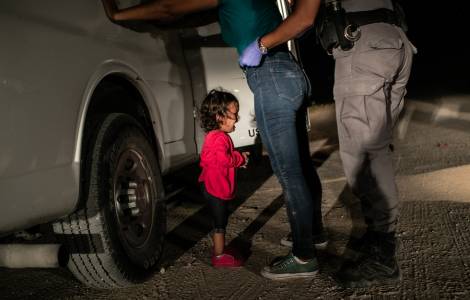
@John Moore.
Tijuana (Agenzia Fides) - Just a few hours ago the jury of the World Press Photo 2019 presented the award as best photo of the year to "Crying girl on the border" by John Moore. The winning image was taken on 12 June 2018 in McAllen in Texas, a town on the border between the US and Mexico, and immediately aroused great emotion, relaunched through all international media. The drama represented was clear: minors separated from migrant families who came to the US border. The photo image shows Honduran toddler Yanela Sanchez crying as she and her mother, Sandra Sanchez, are taken into custody by US border officials.
After its publication, the US border authorities issued a statement stating that Yanela and her mother were not among the thousands of families who had been separated at the border. However, the public indignation regarding the policy of separating children from their families pursued by the American administration forced President Donald Trump to review the provisions in this regard.
The real situation represented in this photo, after almost a year, continues to be the same: the ordeal of caravans that do not stop arriving at the Mexican border with the United States. In recent hours, Fides has received particularly alarming news from Mexico. Under the new immigration policy of the Mexican government, based on respect for the human rights of foreigners in transit in the country, the National Institute of Migration (INM) has recently closed the state centers for migrants in Morelia, Acapulco, Nogales and Reynosa, as stated in the note sent to Fides, "due to the lack of minimum conditions of reception and supply of services". The responsibility to offer food and lodging to migrants along their route, from the southern to the northern border, therefore falls on the few NGOs present and on the Church. Although some municipalities in border towns, such as Tijuana, have a municipal Commission for Migrants, in practice they are the local Churches and some civil society organizations which, with alms and the offerings of the faithful and the donations of citizens, manage to welcome and to feed domestic and foreign migrants.
In Tijuana alone, a Mexican border town, a favorite destination for those seeking to enter the United States, there are 17 "Case del Migrante" run by the Church and by NGOs, still operating but saturated in the maximum capacity for reception for the mass return of Central Americans who had sought asylum in the United States and returned to Mexico pending a US judge's response to their request.
Those responsible of these centers calculate that, overall, they take care of about 1,200 people, including Mexicans and foreigners. For example, the Salesian center of Father Chava offers breakfast and between 800 to 1,500 meals every day, only thanks to the solidarity that comes from the Mexican community, which donates food, medicine, money and voluntary service. Another example is offered by the Embajadores de Jesus Church, which has become one of the largest hostels in Tijuana and currently accommodates 250 people: Haitians, Guatemalans, Hondurans, Salvadorans, Venezuelans, Chileans and even Africans. (CE) (Agenzia Fides, 12/04/2019)